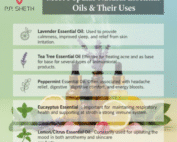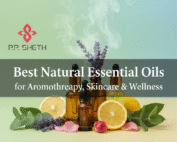Natural oils like coconut oil, shea butter oil, and olive oil have been used for generations to care for the skin and hair. Known for their moisturizing, protective, and antibacterial properties, each natural oil for skin offers unique benefits that support a healthy, glowing complexion. They’ve experienced a renaissance in the last decade as customers look for additive-free, cost-effective products. In this blog, we will discuss the top 5 natural oils and how one can use them to achieve beautiful skin.
Best Oils for Glowing Skin
1. Coconut oil: Coconut oil is quickly absorbed by the skin and has numerous health benefits, including vitamins E and K, as well as antifungal and antibacterial qualities.
2. Olive oil: Olive oil rarely causes allergic responses, however for optimal results, choose extra-virgin. Olive oil has vitamins A, D, E, and K.
3. Sunflower Seed Oil: Sunflower seed oil is widely available, abundant in Vitamin E, and easily absorbed by the skin, making it a great natural moisturizer.
4. Shea Butter: Shea butter, derived from the nuts of the African shea tree, is a tallow-like material that is often found in solid form but melts at body temperature and is used as a moisturizer.
5. Jojoba Oil: Jojoba is native to Mexico and the American Southwest, where Native American tribes extract oils from its seeds and use them for medical purposes. Researchers discovered that jojoba oil may have anti-inflammatory and wound-healing properties, in addition to other skin advantages.
Why Use Oils for Overnight Skincare?
Applying oil to your face at night has various benefits. Natural oils increase hydration. It helps to strengthen your skin’s protective barrier layer, holding moisture inside and keeping it supple and hydrated. Natural oil has anti-inflammatory qualities, which makes it useful for irritated and chafed skin. Several oils create collagen, which helps the skin retain firmness and suppleness. And collagen may prevent the formation of some fine lines and wrinkles.
How to Apply Oils Before Sleeping?
Apply a small amount of natural oil to dry, clean skin before bed, paying particular attention to areas that need additional care or hydration. Let the oil do its magic as you sleep, and gently massage in circular motions until absorbed. Use organic, unprocessed natural oil for best results, and patch test beforehand, especially if you have sensitive or acne-prone skin.
How Natural Oils Help in Skin Repair?
Natural plant oils are widely used as topical therapies globally. They are usually easy to find and economical skin care options. Many natural oils include particular chemicals with antibacterial, antioxidant, anti-inflammatory, and anti-itch characteristics, making them potential substitutes and supplementary treatments for xerotic and inflammatory dermatoses caused by skin barrier disruption. Natural oils’ barrier repair benefits are greatly influenced by their important fatty acid ratios. Oils with a higher linoleic acid to oleic acid ratio have superior barrier repair capacity, but oils with high levels of irritating oleic acid may harm skin barrier function.
DIY Remedies for Skin Repair
If you want your skin to glow and repair, you can try the below which worked good for me
Boiled potatoes and Milk paste
• Boil one half potato and mash it into a paste.
• pour warm milk ( you can either use raw milk or boiled milk) into the paste and make a smooth mixture .
•Rinse and clean your face with suitable cleansers, pat and dry
• apply this potato mixture on to your face.
• Leave it overnight and rinse off in the morning.
How Do Oils Prevent Aging?
Aging is the time-dependent loss or decrease of physiological capabilities required for growth, reproduction, and survival, which leads to senescence. Aging occurs across the entire organism, from cells to organs. Aging affects every part of the body. It is an inescapable process that will last until adulthood.
As a result, individuals are looking for ways to slow down the aging process, and several types of anti-aging agents have been introduced to the market. Essential oil is one of the things that have anti-aging properties. One of the ways that essential oils aid with anti-aging is by addressing the look, where it helps to restore skin suppleness by keeping it moist.
Furthermore, aging can be triggered by free radicals produced during aerobic respiration, which is unavoidable. Free radicals destroy fatty acids, DNA, and proteins, which is what causes aging. In contrast, mitochondrial failure in the aged brain causes an excess of oxidizing free radicals, resulting in oxidative stress and eventual oxidative damage. Numerous essential oils operate as potent antioxidants, protecting against free radicals. As a result, the concentration of free radicals can be lowered, thereby slowing the aging process.
Why Wrinkles Appear and How Oils Help
Although aging is a complicated natural process, fine lines and wrinkles can be difficult to manage. As the skin’s tissues deteriorate, the skin’s natural smoothness and beauty are lost. The possibilities are also countless when it comes to removing freckles and small wrinkles. For wrinkles, think about applying essential oils. They are extremely concentrated and contain every significant volatile compound required to revitalize and maintain the health of the skin. Packed with antioxidants, these essential oils help prevent damage from free radicals, reduce wrinkles, retain moisture, and give your skin a youthful, supple appearance.
Top Anti-Aging Oils for Youthful Skin
Essential oils that are useful in anti-aging include Frankincense, Lavender, Rose, Neroli, Geranium, Sandalwood, Citrus, Carrot seed, Ylang Ylang, and Rosemary. Each of these essential oils has a unique mechanism of action on anti-aging which we will discussed here.
1. Lemon: Lemon is a popular fruit because of its high vitamin C content and its immune-boosting effects. Nonetheless, a number of commercial skin care products also contain lemon oils to help lessen wrinkles and other aging symptoms.Lemon oil has been shown by Trusted Source to help lessen oxidation-related damage. Wrinkles can result from sun damage, which lemon oil may help avoid.
2. Sandalwood: According to preliminary research, sandalwood might have anti-inflammatory qualities. Along with these benefits, sandalwood might aid in skin hydration.
Proper hydration can make the skin look plumper and reduce the visibility of wrinkles and fine lines.
3. Rosemary: In addition to its unique flavor, rosemary is a herb with antibacterial and antioxidant qualities.
Antioxidants found in rosemary may help prevent wrinkles by preventing free radicals from degrading the suppleness of the skin.
4. Frankincense: Frankincense has been shown to be useful in lessening the visibility of stretch marks and scars on the skin. Fine lines and wrinkles could be affected in the same way.
Frankincense can help in skin toning and encourage the creation of new skin cells.
5. Pomegranates: A complex fruit with many health advantages is the pomegranate. They are frequently added to nutritious dishes and beverages as a pleasant and nutrient-rich ingredient.
When applied topically, pomegranates can also lessen inflammation, prevent the formation of cancer cells, and lessen the visibility of sunspots.
Application Tips for Maximum Benefits
Essential oils should never be applied topically without first being diluted in a carrier oil. Olive oil, avocado oil, coconut oil, almond oil, and grape seed oil are examples of common carrier oils.
In a bowl or bottle, people should thoroughly combine the oils. The following should be used on the face:
3-6 drops of essential oil per ounce of carrier oil is recommended for sensitive skin.
6-15 drops of essential oil per ounce of carrier oil is recommended for regular skin.
Before applying the oil to wider sections of skin, a person should test a little amount on a patch of skin 24 hours beforehand. They might be allergic to the oil and shouldn’t take it if they have any irritation after 24 hours.
Firm and Tight Skin
How Oils Improve Skin Elasticity
Skin is the biggest organ in the body. It also acts as a protective barrier against the weather. People’s skin naturally begins to show signs of aging as they become older. In addition to collagen, skin begins to lose elastin, a protein that allows it to stretch and snap back. Elastin is found in the dermal connective tissue.
Essential oils provide a more comprehensive approach to skin tightening. They are applied topically and use absorption via the skin to improve skin texture and suppleness. Essential oils provide skin a beautiful appearance by reducing big pores and repairing and revitalizing cells. These oils have astringent characteristics that encourage skin tightening and give you a youthful appearance. In addition to this, essential oils have also proved to be beneficial in boosting collagen, which helps keep the skin tight and prevents sagging.
Skin Firming Massage Techniques
There are five key massage movements that have a good impact on the skin. Targeted “hand movements” can have a variety of beneficial benefits on the skin, including activating acupressure points, promoting lymphatic drainage, and boosting blood circulation.
Here are five quick and simple massaging techniques that can help firm and energize your skin:
First, apply the desired serum or moisturizer to your face.
Step 1: Place the fingers in the center of the chin and move them towards the temples.
Step 2: Place the fingers at the corners of the lips and slide them upward towards the temples.
Step 3: Finally, place your fingers on either side of your nose and gently glide them back towards the temples.
Repeat the preceding steps three to five times, or up to ten times.
Step 4: Next, place your fingers at the temples and move them up to the hairline. Repeat this procedure 5–7 times.
Step 5: Finally, place your fingers on the bridge of your nose and gently move them towards your forehead. Repeat this procedure 5–7 times.
After the massage, the skin will appear firmer and rosier because the blood flow has been promoted. The ideal skin-firming workout for the face!
Choosing the Right Oil for Your Skin Type
For Oily Skin
Non-comedogenic oils will not cause breakouts, congested pores, or a glossy appearance. Jojoba oil, for example, is extremely effective on acne-prone skin, especially if it is organic. Its makeup is similar to that of sebum, implying that it truly regulates sebum production. It softens the skin, regulates sebum production, eliminates blemishes, and avoids clogged pores. When combined with essential oils like sage, tea tree, rosemary, and lavender, it can be used as a cleanser. Its balancing action also makes it excellent for combination skin, since it eliminates oily T-zones while hydrating dry regions.
For Sensitive Skin
Sensitive skin might flare up just by investing in improper treatment or cream. It needs all of the love in the world to soothe, protect, nourish, and moisturize. Calendula oil can help relieve itchy red areas and inflammation. Made from marigolds, it contains potent antioxidants and anti-inflammatory flavonoids. Its thick viscosity allows it to be readily combined with other oils; sweet almond oil is a fantastic choice for nourishing, soothing, and toning your skin. Sweet almond oil is also effective for relieving eczema.
For Dry Skin
Dry skin lacks suppleness, feels tight, and consumes creams. It also produces leathery lines around our eyes. Pollution, the sun, central heating, and smoking, as well as improper treatments, which are often developed for acne-prone complexions and do not provide dry skin with what it requires. Dehydration occurs when skin is unable to absorb water. We need to pamper it with an oil that will rebuild our skin’s protecting hydrolipidic layer. Avocado oil is loaded with vitamins A, B (including niacin), C, D, E, H, and K. Avocado oil, which is commonly used in face masks, offers moisturizing, regenerative, and protecting characteristics. It’s the dry skin world’s most moisturizing and antioxidant-rich product.
Common Mistakes to Avoid When Using Oils
Essential oils are a fun and effective method to replace chemical-containing products. You may be creative with mixes, create your own projects, and come up with incredible applications! However, many people make typical blunders when using essential oils. Whether you’re an experienced practitioner or new to the field of essential oils, here are some frequent blunders that can happen to anyone.
1) Always dilute prior to applying topically.
Essential oils are concentrated plant essences that can cause burns when used “neat” or undiluted. Always dilute an oil before applying it topically with a carrier oil. Do not dilute with water because oil and water do not mix and will not blend, perhaps resulting in the unintentional application of undiluted essential oil.
2) Run a patch test before applying topically.
Everyone has various sensitivities, thus their skin may react differently than someone else’s. Before using any diluted oil topically, conduct a patch test to check for irritations or allergies. To accomplish this, apply the diluted oil to the inside of your arm, near the elbow. Wait 24 hours for any reaction.
3) Store essential oils properly.
Essential oils should be stored correctly to avoid spoilage or oxidation. Remember to keep essential oils away from direct sunlight and store them at temperate temperatures. High temperatures or excessive cold might ruin the oil. When not in use, keep the cap tightly closed so that air does not damage the oil.
Best Time to Apply Oils for Maximum Effect
According to a study published in the International Journal of Molecular Sciences, applying facial oils topically helps to form a protective skin barrier, acts as an antioxidant, has anti-inflammatory, anticarcinogenic, and antibacterial qualities, and heals wounds.
Nighttime is when your skin’s natural healing and regeneration processes are at their peak, and applying face oils can help to speed up this process while also providing deep hydration. For optimal hydration, choose oils rich in natural emollients such as argan, jojoba, or rosehip oil.
Most Recent Posts








